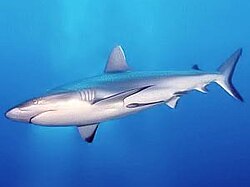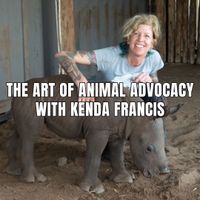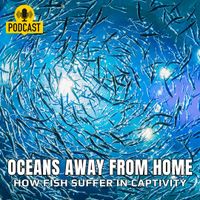Interview:Animal Talk
Latest interviews
Lucy - The Saddest Elephant in the World

Billy Groom speaks with Yvonne Luscombe, an advocate investigating Lucy's situation at the Edmonton Valley Zoo and advocating for her transfer to a sanctuary.
The interview reveals a comprehensive discussion surrounding Lucy's plight, emphasizing the urgency of addressing her welfare and the ethical responsibilities involved in caring for captive animals.
Shark Conservation with Dr. Raj Sekhar Aich

Dr. Raj Sekhar Aich, a transdisciplinary human-shark researcher and artist, shares his insights and experiences regarding shark conservation, human-shark conflict, and multispecies ethnography.
Discover the pioneering work of Raj as he discusses the establishment of the Transdisciplinary Human Shark Lab in Kolkata, India, and his tireless efforts to promote a holistic approach to shark research worldwide. From the Sundarbans to the shores of New Zealand, Raj research delves into the depths of human perception, advocating for interdisciplinary collaboration and cultural sensitivity in conservation efforts.
Full interview - Shark Conservation with Dr. Raj Sekhar Aich
Rescue Spot with Nicole Patrick

Rescue Spot, a technology-driven platform founded by actress-turned-social-entrepreneur Nicole Patrick, is at the forefront of revolutionizing the pet adoption process. In an interview on The Rising Lioness podcast hosted by Erica Salvemini, Nicole discusses her journey from Hollywood to animal welfare. Nicole's non-profit, Chic Chien Chateau, focuses on relocating pets from impoverished areas to affluent ones, saving dogs with life-threatening illnesses.
The interview delves into Rescue Spot's development and its impact on streamlining adoption for both adopters and rescue organizations.
Beluga Whales with the Alaska Wildlife Alliance

n this episode of the Wild for Change podcast, Teresa Becher and Mandy Migura from the Alaska Wildlife Alliance discuss the endangered beluga whales living in the Cook Inlet. Teresa is the beluga whale monetary coordinator, responsible for coordinating monitoring sessions and being an expert on beluga whale behavior in the area. Mandy is the deputy director and Marine program officer for Alaska Wildlife Alliance, and she coordinates a group of nonprofits advocating for the recovery of the beluga whales. They discuss the decline in the beluga whale population and the major threats they face.
Full interview - Beluga Whales with the Alaska Wildlife Alliance
Guanches of the Sea - The Pilot Whales of Tenerife

Embark on a captivating journey into marine conservation with Iro Tsarmpopoulou-Fokianou, a Darwin200 leader, in a special episode of "The Rising Lioness" podcast on All About Animals Radio. Host Erica Salvemini explores Iro's docuseries, "Guanches of the Sea" focusing on the challenges faced by pilot whales in Tenerife. The story unveils the tragic story of Hope, a pilot whale, highlighting the urgent need for environmental protection. Iro's dedication reveals the intricate connection between human activities and marine life, portraying Tenerife as a biodiversity hotspot.
Full interview - Guanches of the Sea - The Pilot Whales of Tenerife
The Art of Animal Advocacy with Kenda Francis

Kenda Francis is a passionate animal advocate and artist who combines her love for animals and art to support animal welfare and wildlife foundations. She creates vibrant and expressive paintings that tell the stories of animals and their struggles. Kenda's dedication extends to organizing events that blend art, animals, and education to make a significant impact on both animals and the environment. She has also traveled to South Africa to witness firsthand the conservation efforts and meet important figures in the field.
Full interview - The Art of Animal Advocacy with Kenda Francis
Oceans Away From Home with Devan Schowe

Devan Schowe, a campaign's associate for Born Free USA delves into the "Oceans Away from Home" report, which highlights the suffering of fish in captivity. Fish often face challenges that parallel those of larger, more commonly studied captive animals. This report emphasizes the challenges these aquatic creatures encounter, including compromised welfare and limited opportunities for species-specific behaviors. A research bias further sidelines fish, underscoring the need to value all animals, irrespective of their similarities or differences from humans. Additionally, the rising surge of octopus farming in Spain, raises ethical concerns due to the remarkable intelligence of these creatures. Octopus farming subjects highly intelligent and solitary beings to stressful and unnatural conditions, posing ethical and ecological dilemmas.
Wildlands Network with Ron Sutherland

Wildlands Network's Chief Scientist, Ron Sutherland, discusses the importance of rewilding efforts and their vision of continental wildways to promote wildlife conservation in North America. Rewilding, a concept rooted in letting nature reclaim its territory, emphasizes the need to reintroduce keystone species to restore ecological balance. Ron explains how rewilding helps to manage ecosystems more efficiently and highlights the case of Yellowstone's wolf reintroduction, which led to a cascade of positive ecological effects. The concept of continental wildways involves creating extensive wildlife corridors to connect natural areas, enhancing biodiversity and promoting species migration, especially in the face of climate change. Ron Sutherland emphasizes the importance of partnerships with land trusts and conservation organizations to establish these corridors and protect critical habitats.
The Black Mambas

Erica Salvemeni chats with Craig Spencer and Leitah Mkhabela, part of the Black Mambas Anti-Poaching Unit in South Africa. Craig Spencer is the executive director of Trans-Frontier Africa and founder of the Black Mambas, while Leitah Mkhabela is a supervisor and ambassador for the all-female anti-poaching unit. The Black Mambas initiative, started in 2013, employs 36 women from local tribal communities to protect wildlife, particularly rhinos, from poaching. Craig Spencer's motivation to create the Black Mambas came after losing rhinos to poaching, realizing the need for a different approach to conservation. He sought to invest in the young women of the community who already showed caring and nurturing attitudes towards nature, aiming for a multi-generational impact.
